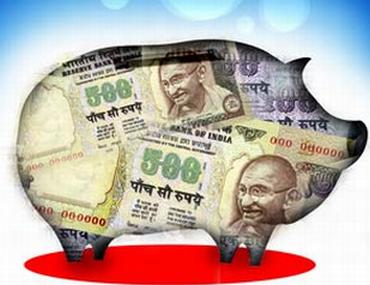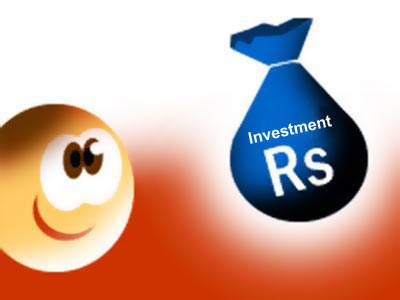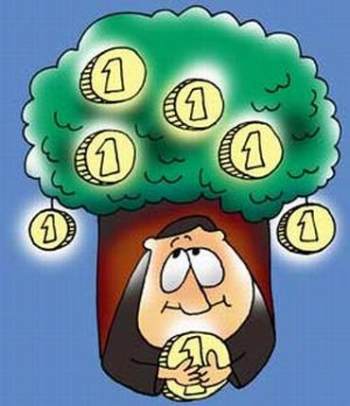Photographs: Rediff Archives Fundsupermart.com
Have you ever borrowed money from someone? You must have. All of us have had to borrow money sometime in our lives. And there are usually all kinds of reasons as to why we need to borrow money.
Similarly, companies, and even governments, might need to borrow money from time to time. However, the sums of money that they borrow are very large. So what they do is that they issue bonds.
What are bonds?
Bonds are basically loans, where you are the lender.
The companies or government which borrow the money from you, have to agree not only to pay back the amount they borrowed, but also to pay a little extra in the form of a fee (interest) for the privilege of borrowing your money.
These interest payments (coupons) are usually paid at regular intervals (for example, every half a year). The full amount that is loaned out (the principal) is returned back to the lender (you) at a certain date in future. This date is called the maturity date.
Disclaimer: This article is for information purpose only. This article and information do not constitute a distribution, an endorsement, an investment advice, an offer to buy or sell or the solicitation of an offer to buy or sell any securities/schemes or any other financial products /investment products mentioned in this article or an attempt to influence the opinion or behavior of the investors /recipients.
Any use of the information /any investment and investment related decisions of the investors/recipients are at their sole discretion and risk. Any advice herein is made on a general basis and does not take into account the specific investment objectives of the specific person or group of persons. Opinions expressed herein are subject to change without notice.

How to invest in bonds and get rich
A bond is basically a piece of paper in writing that says that such-and-such company or government borrowed so much money from you. The main difference between stocks and bonds is that the company or government guarantees to pay you back the money you lent, plus interest. You know exactly how much you are going to get back, and when you are going to get it.
Bonds with less than one year to maturity are known as money market (more on it later) instruments (there are mutual funds which invest solely in these money market instruments).
Bonds and money market instruments are also known as fixed-income/debt investments. This is because they pay out a regular 'income' (the interest coupons) to investors.
How to invest in bonds and get rich
How risky are bonds?
Although the company whom you lent your money to guarantees to pay you back, it does not mean that bonds are risk-free.
Companies and even governments can, and do go bankrupt. However, when that happens, bondholders will be paid first before paying a single rupee to the shareholders.
But perhaps the most risky thing to bondholders is a rising inflation rate. When the economy is booming and unemployment rates are falling, that is when bonds and bondholders suffer the most (the reverse applies, recessions are great for bonds!).
Inflation causes prices of things in general to rise. This means that Rs 100 in the future would be able to buy less goods and services than Rs 100 now. So your fixed coupon from bonds would buy you less if there was inflation.
This also means that the money which you get back when your bond matures would be worth a lot less than what it is worth now when you loan it out. So the faster inflation rises, the faster your bond loses value.
How to invest in bonds and get rich
Interest rates
Bank interest rates are another thing bond investors need to watch out for.
Rising bank interest rates cause bond prices to fall, and vice versa. This is because bonds pay a fixed coupon. As bank interest rates fall, people are willing to pay more money for the bond because its fixed coupon may represent a higher return than other similar instruments like the fixed deposits.
Conversely when bank interest rates rise, people are less willing to hold on to bonds because interest income from fixed deposits would be higher than the fixed coupon of bonds issued in the past, hence leading to a fall in bond prices (or capital depreciation).
How to invest in bonds and get rich
Bond mutual funds
If you see bonds as an essential part of your investment portfolio, but yet lack the time or investment capital to buy into local bonds (which can have high initial investment requirements), then opt to invest in a bond mutual fund.
Bond mutual funds are basically a collection of different types of bonds. Instead of an individual bond, you are buying into a ready portfolio of bonds.
A lot of people opt for bond mutual funds when they seek to diversify their investments with some fixed-income exposure. Even aggressive investors invest in bonds when the timing calls for it.
How to invest in bonds and get rich
Basics of investing: Money market securities
What is it?
The money market, despite its name, does not trade in currencies.
Rather, it trades in low-risk, highly liquid, short term debt instruments issued by governments, financial institutions and corporations. The maturities of these securities range from one day to one year, but are often less than 90 days.
Money market securities comprise of treasury bills, commercial papers (CPs), negotiable certificates of deposits (CDs) and repurchase agreements.
how to invest in bonds and get rich
How it works
Generally, money market instruments work on the principle of 'discount'.
For example, an RBI Treasury Bill with 90 days left to maturity may have a face value of Rs 100,000, but is selling in the money market at Rs 98,500. If you buy it at this price, all you have to do is wait 90 days, and you can redeem this note from the RBI for Rs 100,000, and pocket the profit of Rs 1,500. (Rs 1,500 out of an investment of Rs 98,500 over 90 days is a return of about 6% per annum).
A large corporation, or a bank, can also issue something similar. These are referred to as commercial papers (CPs), and are traded in the money markets using the same principle of discount (that is, they promise to pay a fixed price at specified time, but sell at a slightly lower price in the money market).
Money market securities are considered very low risk. RBI Treasury Bills (T-Bills), which are guaranteed by the RBI, are practically default free. The 'discount rate' of these T-Bills, (in our above example, 6%), is usually used as the proxy for the 'risk-free' rate of return. This is the rate which financiers use in their calculation of returns to their investments (other investment instruments have to give returns higher than this rate, or else investors might as well buy the guaranteed T-bills).
Debt notes issued by corporations or banks and traded in the money markets are often with high quality, and the default rate is usually very low.
how to invest in bonds and get rich
How to invest
Unfortunately, most money markets cater to institutional investors and are not accessible to retail investors.
The only way to participate is to buy a money market mutual fund. (Here, at Fundsupermart.com, you might want to check out the mutual funds listed under 'Debt' fund category and 'Liquid' fund class as well, because most of these mutual funds participate in the money market quite actively).
You will find that most of these mutual funds have performed very consistently, returning 7% to 10% annually.
Money market mutual funds are great for investors who are risk averse.
Investors who are thinking of taking money out of their fixed deposits and investing in mutual funds might find that money market mutual funds are a great way to start because of their low risk nature.
Even for investors who are familiar with mutual funds, most experts recommend that some portion of their investment portfolios should comprise of money market instruments for stability and liquidity. In case you need some emergency cash, you can redeem your money market mutual funds with very rare instances of loss to capital.









Comment
article